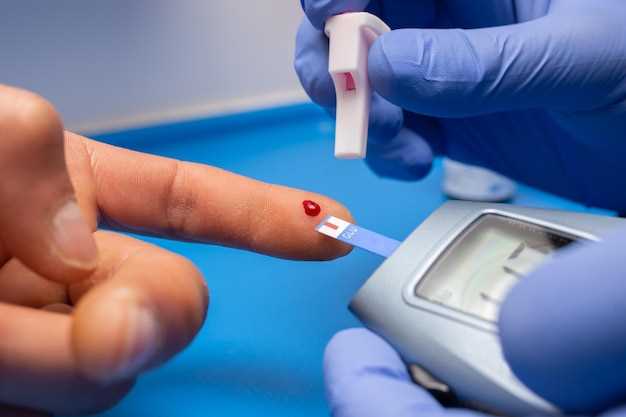
Are you curious about the relationship between a widely known medication and your body’s glucose levels?
Here, we will explore the intricate link between bupropion and the regulation of your blood sugar, shedding light on the potential effects this medication may have on your overall well-being.
Uncover the latest research findings, gain a deeper understanding of how bupropion may impact your metabolism, and learn about the potential benefits and considerations for individuals with varying glucose management needs.
Bupropion and Blood Glucose

Bupropion, a widely prescribed medication, has been the subject of much interest and discussion in relation to blood sugar levels. Understanding the potential impact of bupropion on glucose metabolism is crucial for individuals seeking to manage their blood glucose levels effectively. This section aims to shed light on the benefits of bupropion, its effects on blood glucose levels, and considerations for diabetic patients.
Exploring the Benefits
Bupropion offers a range of advantages for individuals seeking assistance with various health concerns. Many users have reported positive outcomes associated with its usage. One significant aspect to consider is its potential influence on blood glucose levels. By uncovering the relationship between bupropion and glucose metabolism, individuals can make informed decisions about their medication usage and overall health management.
Understanding Effects on Glucose Levels
Research has indicated that bupropion may have an impact on blood sugar regulation. While the mechanisms behind this effect are still being explored, it is essential to understand how bupropion interacts with the body’s metabolic processes. Individuals who are monitoring their blood glucose levels should consult with their healthcare provider to determine how bupropion may affect their unique circumstances and to develop an appropriate management plan.
Managing Blood Glucose Levels while taking Bupropion
It is vital for individuals using bupropion to closely monitor their blood glucose levels. Regular and consistent monitoring, along with proper consultation with healthcare professionals, can help individuals achieve optimal health outcomes. Adhering to a balanced and nutritious diet, engaging in regular physical activity, and maintaining a healthy lifestyle overall are all critical components of managing blood glucose levels effectively while using bupropion.
Considerations for Diabetic Patients
For individuals with diabetes, understanding the potential interactions between bupropion and blood glucose levels is particularly crucial. Diabetic patients should work closely with their healthcare team to ensure proper management and monitoring of blood sugar while using bupropion. Regular check-ins, adjustments in medication or dosage, and ongoing education about the interplay between bupropion and diabetes will help individuals maintain optimal health and well-being.
Benefits of Bupropion
Discover the advantages of incorporating this medication into your routine. Bupropion offers a wide range of benefits that go beyond its impact on blood glucose levels.
- Enhanced mood and well-being: Bupropion has been shown to help improve emotional state and overall happiness, allowing you to experience life to the fullest.
- Increased motivation: By stimulating certain neurotransmitters in the brain, Bupropion can enhance motivation and drive, making it easier to tackle daily tasks and goals.
- Smoking cessation: As a well-known aid for quitting smoking, Bupropion can support you on your journey to a smoke-free life, providing relief from nicotine cravings and withdrawal symptoms.
- Weight management: Bupropion has been found to assist with weight loss and weight maintenance, helping individuals achieve their desired health and physique goals.
- Improved cognition: Many users report better cognitive function and enhanced focus while taking Bupropion, allowing for increased productivity and mental clarity.
- Positive impact on sleep: Some individuals find that Bupropion improves their sleep quality, ensuring they wake up feeling refreshed and rejuvenated.
These are just some of the advantages that Bupropion can provide beyond its effects on blood glucose levels. When considering a medication for your needs, it’s important to weigh all the potential benefits to make an informed decision.
Effects on Blood Sugar Levels

When considering the impact of this medication on glucose regulation, it is essential to understand the potential effects it may have on blood sugar levels. By taking Bupropion, one should be aware of the possible changes that can occur in the amount of glucose present in the bloodstream.
Managing Blood Glucose Levels
Properly maintaining blood sugar levels while undergoing treatment with this medication is crucial for individuals with diabetes or those at risk of developing this condition. It is advisable to closely monitor and adjust your dietary intake and physical activity levels in consultation with a healthcare professional. A balanced approach to managing glucose levels is necessary to ensure optimal health and well-being.
Considerations for Diabetic Patients
If you have diabetes and are considering taking Bupropion, it is imperative to discuss your treatment plan with a healthcare provider. They can provide specific guidance based on your individual needs and medical history. It may be necessary to monitor blood sugar levels more frequently and make adjustments to your diabetes medication or insulin doses to maintain stable glucose levels.
Managing Blood Sugar Levels while taking Bupropion
Discover effective strategies to regulate your blood sugar levels when using this medication.
When you are prescribed this medication, it’s important to be mindful of your blood sugar levels to ensure optimal health. Maintaining a stable blood sugar level is crucial for individuals to manage their diabetes effectively. In this section, we will discuss various approaches and recommendations to balance your blood sugar levels while taking this medication.
One key aspect to consider is the importance of following a well-balanced and nutritious diet. Consuming a diet rich in whole grains, lean protein, and healthy fats can contribute to a steady blood sugar level. Additionally, portion control and regular meal timings can help in managing blood sugar fluctuations, promoting better glucose control.
Regular physical activity is another crucial factor in maintaining stable blood sugar levels. Engaging in moderate-intensity exercises such as walking, cycling, or swimming can aid in the regulation of your blood sugar. Physical activity helps your body effectively utilize glucose for energy, reducing the chances of blood sugar spikes or dips.
Monitoring your blood sugar levels consistently is vital while taking medication. Regularly testing your blood sugar and keeping a record of the readings can provide valuable insights into how your body responds to the medication. This information can assist you in making any necessary adjustments to your diet, physical activity, or medication dosage under the guidance of your healthcare professional.
Lastly, it is crucial to maintain open communication with your healthcare provider. They can provide personalized advice and guidance on managing blood sugar levels while taking this medication. Your healthcare provider may recommend specific lifestyle modifications or prescribe additional medications, if required, to ensure your blood sugar remains within a healthy range.
Remember, managing your blood sugar levels is essential for your overall well-being when taking this medication. By following a balanced diet, engaging in regular physical activity, monitoring your blood sugar levels, and staying in touch with your healthcare provider, you can successfully maintain stable blood sugar levels and effectively manage your diabetes.
Considerations for Diabetic Patients
When it comes to managing diabetes, it is crucial to take into account certain factors that may affect blood sugar levels. This section will discuss important considerations for individuals with diabetes who are using a specific medication that may have an impact on their glucose levels.
Understanding the Impact
For diabetic patients, it is essential to be aware of how certain medications can interact with their blood sugar levels. It is important to note that while taking this medication, there may be an effect on the body’s ability to regulate glucose levels. Therefore, it becomes necessary to closely monitor blood sugar levels and make appropriate adjustments in diabetes management plans.
Managing Glucose Levels
Patients with diabetes should proactively work with their healthcare provider to establish a comprehensive plan for managing their blood sugar levels while taking this medication. Regular monitoring of glucose levels becomes crucial as it allows for timely adjustments in insulin dosages or dietary modifications, ensuring that blood sugar remains within a healthy range.
It is imperative for diabetic patients to maintain open communication with their healthcare team and promptly report any changes or concerns related to their blood sugar levels.
In addition to glucose monitoring, a well-balanced diet and regular exercise should also be emphasized for effective management of diabetes. These lifestyle modifications can contribute to maintaining stable blood sugar levels and overall wellness.
By understanding the considerations specific to diabetic patients, individuals can work towards achieving optimal glucose control while utilizing this medication to its full potential.
